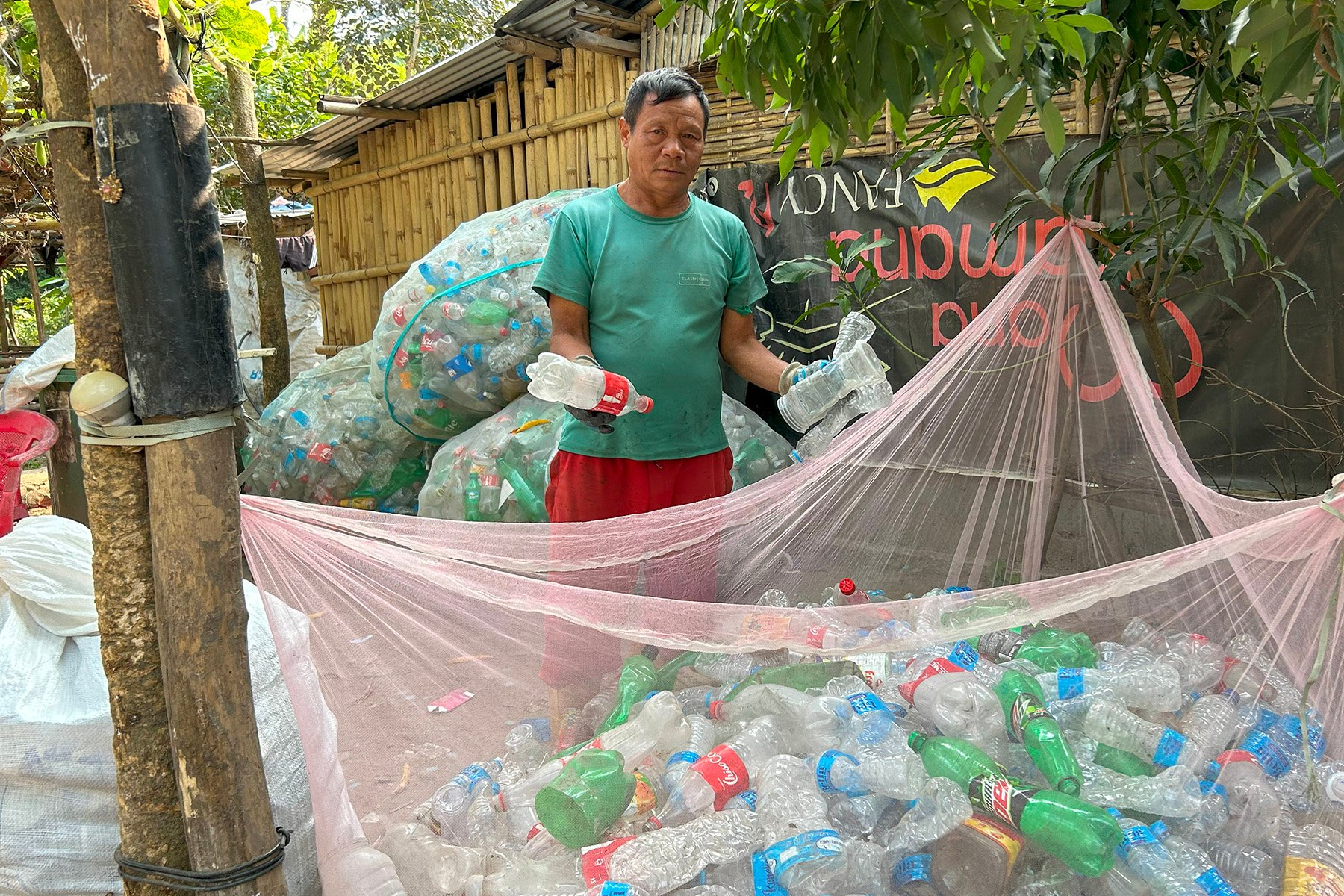Turning waste into wealth: A refugee’s story of resilience and climate action
Turning waste into wealth: A refugee’s story of resilience and climate action

Bhutanese refugee Amber Bahadur Jogi organizes the waste he has collected in his storage facility located within a refugee settlement in eastern Nepal.
The 58-year-old has turned plastic waste into a sustainable livelihood, championing climate action in his community, and proving that transformative change can begin with small steps.
Amber, a member of the Lhotshampas – a Nepali-speaking minority in Bhutan, was born in Gelephu and fled to Nepal with his family in the early 1990s, along with tens of thousands of others. Between 2007 and 2016, 113,500 Bhutanese refugees, including Amber’s own younger brothers, have resettled to third countries, but Amber and his family chose to remain in Beldangi to care for his aging parents.
Refugees in Nepal face many challenges as the government does not issue work permits, forcing people like Amber to find creative, informal ways to support their families. Today, alongside his elder brother, wife, and two daughters, he has created a meaningful life by addressing one of the most pressing global challenges—plastic pollution.
Trash is Cash
Amber’s journey into waste collection began in 2019. Previously, he earned a living by rearing pigs, but a chance encounter at a local marketplace changed his trajectory.
“I saw some people collecting plastic, and when I asked what they were doing, they said they were collecting money,” Amber recalled. “That moment sparked an idea.”
He realized his settlement produced substantial plastic waste, offering an income opportunity while contributing to the environment.
Damak Municipality, where the Beldangi settlement is located, generates 24 tons of waste daily, of which 35 per cent is plastic and other non-biodegradable materials. While they have been exploring innovative solutions on waste management, Bhuwan Baral, the municipality’s Environment Officer, acknowledges the role of grassroots efforts like Amber’s.
“Individual waste collectors are vital in supporting the Municipality’s waste management efforts,” he said. “Their work complements our strategies for climate resilience, including waste management, tree plantation, and ground-level awareness.”
To further support waste collection and management in the municipalities of Damak and Pathari-Sanishare, UNHCR also provided two tipper trucks in 2021.

A tipper truck donated by UNHCR to Damak Municipality is parked on the municipal premises. In 2021, UNHCR donated two tipper trucks to enhance waste management services in Damak and Pathari-Sanishare municipalities.
Amber started out small, but today he collects an average of 10 kilograms of waste daily, consisting of 60 per cent plastic, 20 per cent metal, and 20 per cent paper cartons. He alone has prevented over 2,000 kilograms of waste from entering landfills or polluting waterways.
He earns around 20,000 Nepali Rupee (150 US dollars) per month by selling the collected waste to a vendor based in nearby Damak town, who sends it for recycling. The money is enough to support his family of six while contributing to climate resilience. His daughters attend a local public school, benefitting from Nepal’s policy of free education and books for all, including refugee children, supplemented by modest cash support from UNHCR.
Greening from the Grassroots
Amber’s initiative has inspired significant change within his community. Approximately two dozen refugees in the settlement have followed his lead.
“This business has helped me feed my family well,” shares Tul Bahadur Gurung, who started waste collection a year ago to support his family of three.
Amber’s leadership has also encouraged waste segregation practices in the settlement. Although still in its early stages, residents are gradually adopting the habit of separating waste for collection. He purchases segregated plastic and other recyclable materials from households, paying small amounts to motivate them.

Amber Bahadur Jogi collects plastic and other waste in the refugee settlement in eastern Nepal.
Nearby host community members like Kabita Limbu have also embraced these changes:
“I used to burn waste, but now I hand it over to Amber, who ensures it’s recycled. It’s better for the environment, and he earns from it too.”
Amber’s work aligns with Nepal’s ambitious climate targets outlined in the Long-term Strategy for Net-zero Emissions, which aims for net-zero emissions by 2045 and negative carbon emissions by 2050. As plastic production and disposal contribute to approximately 3 per cent of global emissions by the estimates of the Organisation for Economic Co-operation and Development (OECD), individual efforts like Amber’s can contribute toward these goals.
A Recycling Revolution
UNHCR and its partner, Lutheran World Federation (LWF) Nepal, have also been active in enhancing Amber’s operations. A business start-up support provided him with a customized bicycle capable of carrying heavy loads, as well as protective gear such as gloves, boots, and raincoats. These tools have improved the safety and efficiency of his work.
“The bicycle is a game-changer,” said Amber. “And the protective gear has prevented injuries. I’m grateful to UNHCR and LWF for their support.”

Amber Bahadur Jogi sets out from his home on a bicycle, wearing protective gear provided by UNHCR through its partner, LWF, as he collects waste in a refugee settlement in eastern Nepal.
Amber’s story underscores the power of grassroots initiatives to address global challenges like plastic pollution while fostering sustainable livelihoods.
“Amber's work highlights the resilience and resourcefulness of refugees, showing that with support and opportunities, they can drive meaningful change,” said Monique Sokhan, UNHCR Representative in Nepal. “His efforts tackle environmental issues while promoting sustainable practices within the settlement and beyond.”
Amber envisions a future where waste segregation and recycling are integral to community life. While challenges remain, his initiative has already inspired change.
“I’m proud to contribute to the environment and support my family,” he said. “Together, we can build a cleaner, more sustainable future.”





